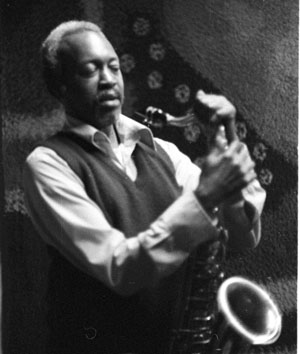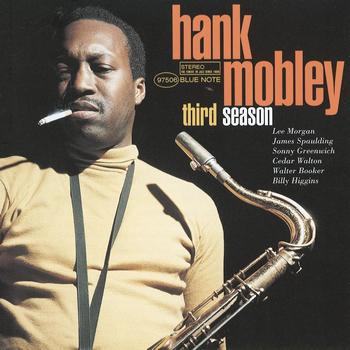Aperitif – Hank Mobley
A minor-key medium-up swinger with that unmistakable Mobley bounce. A full set of parts is available for the 3-horn arrangement from the recording.
- Recording: Hank Mobley - Third Season
- Recorded on: February 24, 1967
- Label: Blue Note (LT 1081)
- Concert Key: C minor
- Vocal Range: , to
- Style: Swing (medium up)
- Trumpet - Lee Morgan
- Alto Sax - James Spaulding
- Tenor Sax - Hank Mobley
- Guitar - Sonny Greenwich
- Piano - Cedar Walton
- Bass - Walter Booker
- Drums - Billy Higgins
0:00
0:00
Buy MP3
Video
- Description
- Historical Notes
- Solos
- Piano Corner
- Bass Corner
- Drum Corner
- Guitar Corner
- Inside & Beyond
- Minus You
An Aperitif is a great example of the snappy, driving hard bop style Hank Mobley excelled at. After an introduction by Billy Higgins, the A section melody begins with bouncy staccato rhythms which are contrasted by a smoother, downward spiraling phrase in the last three measures. The bridge develops a single phrase that descends in fourths, over minor 11th chords. The changes are very simple, with C minor for basically the entire A section.
This is not a modal C minor—our lead sheet has turnarounds in parentheses on the second and fourth measures of the head, which are occasionally played in the solos as well. The bridge goes to F minor twice, the second time descending in minor thirds to A♭m7 for a tritone substitute II-V7 back to C minor.
The bass walks throughout the head, but the piano and drums play a few hits that line up with the melody. These are shown in our piano and drum parts. Our drum part also has a couple of fills that Billy Higgins plays on the recording. Drummers also have the option of reading the C lead sheet if they would rather see the melody and changes.
Second and third parts are available for the 3-horn arrangement—really a sextet arrangement rather than a septet; on the recording, guitarist Sonny Greenwich only solos and does not comp or play the melody. The horns are in unison and octaves except in the second half of the A section, where they are voiced in triads.
This is not a modal C minor—our lead sheet has turnarounds in parentheses on the second and fourth measures of the head, which are occasionally played in the solos as well. The bridge goes to F minor twice, the second time descending in minor thirds to A♭m7 for a tritone substitute II-V7 back to C minor.
The bass walks throughout the head, but the piano and drums play a few hits that line up with the melody. These are shown in our piano and drum parts. Our drum part also has a couple of fills that Billy Higgins plays on the recording. Drummers also have the option of reading the C lead sheet if they would rather see the melody and changes.
Second and third parts are available for the 3-horn arrangement—really a sextet arrangement rather than a septet; on the recording, guitarist Sonny Greenwich only solos and does not comp or play the melody. The horns are in unison and octaves except in the second half of the A section, where they are voiced in triads.
"Third Season" was recorded at the legendary Van Gelder Studio in Englewood Cliffs.
For more songs from this album, check out Boss Bossa and Don't Cry, Just Sigh. "Third Season" was the last album that Hank Mobley and Lee Morgan played on together. It was also Sonny Greenwich's first studio recording. The Toronto-based guitarist was visiting New York on a tour with saxophonist John Handy. Earlier in February 1967, Cedar Walton and Walter Booker recorded on Art Farmer's album "The Time And The Place."
For more songs from this album, check out Boss Bossa and Don't Cry, Just Sigh. "Third Season" was the last album that Hank Mobley and Lee Morgan played on together. It was also Sonny Greenwich's first studio recording. The Toronto-based guitarist was visiting New York on a tour with saxophonist John Handy. Earlier in February 1967, Cedar Walton and Walter Booker recorded on Art Farmer's album "The Time And The Place."
Related Songs
Email Send Aperitif to a friend
Send this page to a friend via email. Add your name or email in the first field. In the second, add one or more email addresses, separated by a comma.

Hank Mobley
July 7, 1930 – May 30, 1986
Hank Mobley is one of the most acclaimed tenor saxophonists in modern jazz history. He is recognized by musicians and critics alike as one of the most important and eloquent jazz instrumentalists of all time. He recorded well over 100 of his own original compositions and left an indelible mark on the post-bop jazz scene. Read more...
There was a problem.
...

